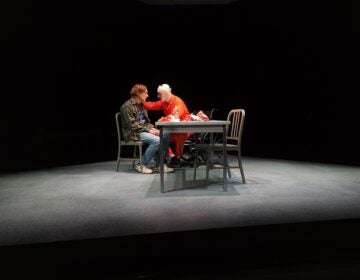Writing about illness can help cancer patients feel better
The Pennsylvania Hospital in Center City, Philadelphia, offers writing tips to cancer patients.
A daily habit of creative writing has been shown to improve a cancer patient’s well-being. But it’s not for everyone.
A study published in 2007 in the medical journal The Oncologist found that cancer patients who write 20 minutes a day felt quantitatively better.
“Even physically they felt better,” said writer and editor David Tabatsky. “They were sleeping better at night, they ate better, they communicated better with their doctors, and the writing facilitated that.”
The pharmaceutical company Genentech hired Tabatsky to lead writing workshops in cancer-treatment hospitals. On a Thursday evening at Pennsylvania Hospital, about 20 people in various stages of recovery started with projects such as writing letters that will never be sent, writing in dialogue, or completing the sentence “I am …”
Many of the participants had little or no formal writing experience. Some were hesitant to dwell on negative feelings associated with having cancer–existential confusion, all-consuming fear, and anger.
Tabatsky encourages them to be selfish on paper.
“You better be selfish–you may not have much more time to be selfish,” said Tabatsky. “I don’t tell them that in that moment, of course, but everyone in the room can put two and two together. This is a cancer hospital. We are all aware of the realities these people are dealing with.”
“I know all about selfish,” said David Ellis, 78. “It has a pejorative tone, but I don’t see it as something negative.”
Ellis was diagnosed with pancreatic cancer seven weeks ago. He came to the workshop to better understand the therapeutic value of the writing process. His wife, Adrianne, was not inspired.
“I’ve had two different cancers, and I just dealt with them,” said Adrianne Ellis, 77. “I’ve had a mastectomy, I’ve had a lobe removed from my lung, and that was that. I haven’t pursued anything with cancer. I don’t think I’m in denial, but I just go on with my life. I came mainly because I was so glad he wanted to do this.”
Many of the participants said the writing helps them understand their own reaction to their illness, and to communicate better with family, friends, and doctors.
WHYY is your source for fact-based, in-depth journalism and information. As a nonprofit organization, we rely on financial support from readers like you. Please give today.




